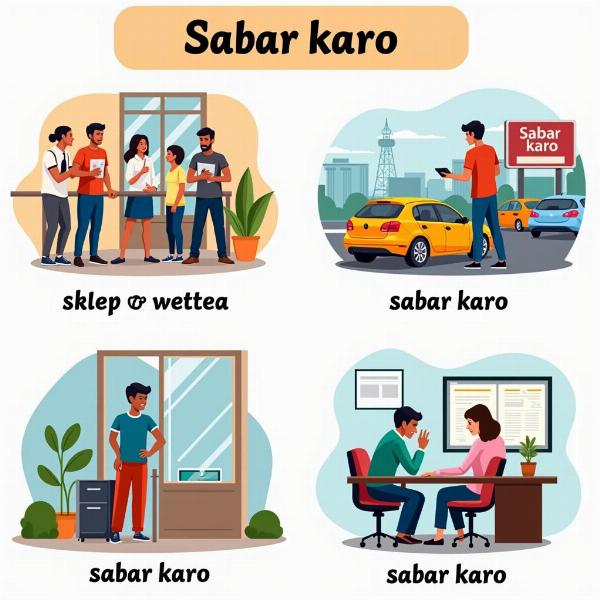The phrase “sabar karo” is a common expression in Hindi, deeply ingrained in Indian culture. It translates to “be patient” or “have patience” in English. Understanding the meaning of “sabar karo” goes beyond a simple translation; it delves into the cultural significance of patience in Indian society and its impact on daily life. This article will explore the various nuances of “sabar karo meaning in hindi,” its usage in different contexts, and the profound wisdom behind this simple yet powerful phrase.
The Essence of “Sabar Karo” in Indian Culture
“Sabar karo” is more than just a polite request; it represents a deeply held cultural value. Patience, or “sabar,” is considered a virtue in India, often linked to spiritual growth and inner peace. It’s seen as the ability to calmly endure difficult situations, maintain composure amidst chaos, and persevere through challenges without losing hope. This emphasis on patience is reflected in various aspects of Indian life, from religious practices to interpersonal relationships.
In Hinduism, the concept of “sabar” is closely associated with the idea of karma and dharma. It encourages individuals to accept their current circumstances with grace and focus on fulfilling their duties without attachment to the outcome. Similar philosophies are found in other Indian religions like Sikhism, Buddhism, and Jainism, further highlighting the universal importance of patience in the Indian spiritual landscape.
Everyday Usage of “Sabar Karo”
“Sabar karo” finds its way into everyday conversations across India. Parents use it to soothe their children, friends offer it as words of encouragement, and even strangers might utter it in situations requiring composure. It’s a versatile phrase that can convey empathy, offer support, or simply urge someone to remain calm.
- In traffic jams: “Sabar karo, the traffic will eventually clear.”
- Waiting in line: “Sabar karo, your turn will come.”
- Facing difficulties: “Sabar karo, this too shall pass.”
 Everyday Examples of Sabar Karo
Everyday Examples of Sabar Karo
Why is “Sabar Karo” so Important?
The importance of “sabar karo” stems from its ability to foster resilience and emotional stability. Patience allows individuals to navigate life’s inevitable challenges with greater ease, reducing stress and promoting mental well-being. It also strengthens interpersonal relationships by encouraging understanding and empathy.
What are the benefits of practicing Sabar?
Practicing “sabar” can lead to numerous benefits:
- Reduced stress and anxiety: Patience helps to manage emotional responses to stressful situations.
- Improved decision-making: Calmness and patience allow for clearer thinking and better choices.
- Stronger relationships: Patience fosters understanding and empathy in interactions with others.
- Increased resilience: The ability to endure hardship cultivates resilience and inner strength.
“Sabar Karo” and its Connection to Mindfulness
The concept of “sabar karo” aligns with the principles of mindfulness, which emphasizes being present in the moment without judgment. By cultivating patience, individuals learn to accept their current experiences, both positive and negative, without getting caught up in emotional reactivity. This acceptance fosters a sense of peace and allows for greater clarity in navigating life’s complexities.
Conclusion: Embracing the Wisdom of “Sabar Karo”
“Sabar karo” encapsulates a profound wisdom that has resonated within Indian culture for centuries. It’s a reminder to cultivate patience as a valuable life skill, promoting emotional well-being, fostering resilience, and strengthening interpersonal connections. By embracing the essence of “sabar karo,” we can navigate the complexities of life with greater ease and grace.
FAQ:
- What is the literal translation of “sabar karo”? The literal translation of “sabar karo” is “have patience” or “be patient.”
- How is “sabar” viewed in Indian culture? “Sabar” is considered a virtue, essential for spiritual growth and inner peace.
- Why is patience important? Patience helps manage stress, improve decision-making, and strengthen relationships.
- How can I practice “sabar”? Mindfulness practices, such as meditation, can help cultivate patience.
- What is the connection between “sabar karo” and mindfulness? Both emphasize being present in the moment and accepting experiences without judgment.
- How does “sabar karo” contribute to emotional well-being? It promotes calmness and reduces emotional reactivity to stressful situations.
- How does “sabar karo” benefit interpersonal relationships? It fosters understanding and empathy, leading to stronger connections with others.
Meaning-Hindi.in is your trusted partner for professional Hindi translation services. We offer a comprehensive range of solutions, from business and legal document translation to website localization and technical manual translation. Our expert linguists ensure accurate, culturally sensitive translations that meet your specific needs. Whether you require business and commercial document translation, certified and legal document translation, technical and user manual translation, website and localization translation, educational and academic document translation, express translation, or specialized industry translation, Meaning-Hindi.in has the expertise to deliver exceptional results. Contact us today at [email protected] or +91 11-4502-7584 to discuss your translation needs. Let Meaning-Hindi.in bridge the language gap for you.